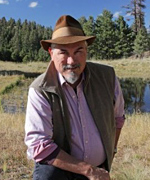— Alan Dulaney
 The election is over. Huge changes lie ahead on the Federal level. What they might be remains murky; as of right now, there is not even an appointment of a Secretary of the Interior (BLM, Parks, Reclamation, others) to mull over. But a couple of things might happen.
The election is over. Huge changes lie ahead on the Federal level. What they might be remains murky; as of right now, there is not even an appointment of a Secretary of the Interior (BLM, Parks, Reclamation, others) to mull over. But a couple of things might happen.
The WOTUS rule looks dead as a doornail. Congressional opposition to the proposed rule is strong, and represents one thing that the Congress and the new President can agree on. “Waters of the United States” had a nebulous definition that needed clarity, but while the rule cleaned up some language, it introduced new concepts. This love-child of the EPA and the Corps of Engineers had something for almost everyone to hate, despite the best labors of its parent agencies. Even if President Obama were to try to push it through in a hurry, President Trump would likely push the other direction to eliminate it. The EPA will probably not be on his list of favorites come January 20. So any efforts to revise the rule language must perforce begin again.
The Water Resources Development Act is a $5B monster that appears to be on a fast track for President Obama’s signature. It provides money for a variety of infrastructure projects in 17 states. It addresses water resources challenges by providing grants for projects involving water reuse, desalination, drought planning, and other approaches to supply-demand imbalances. The initial impetus may have come from California, but it is far broader in scope now and has considerable support. Yet despite the pre-Thanksgiving reconciliation between the House and Senate versions, this bill is not yet final. Passage is nonetheless expected.
One thing that must weigh heavily on the minds of Federal employees is the new broom effect. Considerable turnover, especially in upper management ranks, can be expected after January 20. This could wind up hurting negotiations where long-time Federal employees (read Reclamation) have in-depth knowledge and appreciation for the nuances of water resources. Hopefully no mass exodus of talent will be seen, but this remains a major unknown.
If anyone is looking elsewhere for a job, researchers at the University of Texas at Austin have offered an interpretation of landforms on the plains of Planitia Utopia that may create some new opportunities for hydrologists. The researchers believe that a vast body of subterranean ice lies preserved below the Martian soil, with a water equivalent volume approximating Lake Superior. Extra-terrestrial hydrology, anyone?